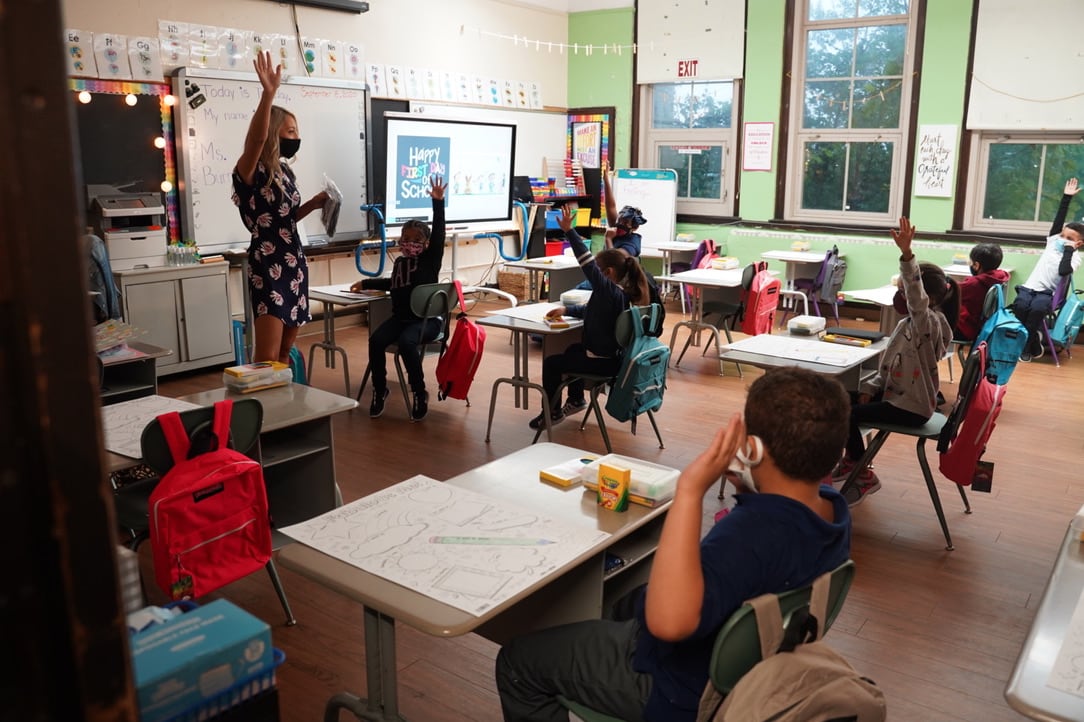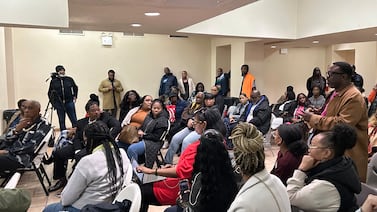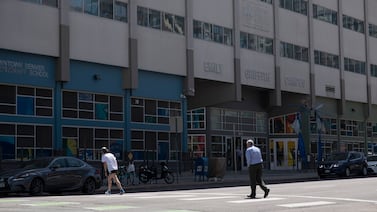Happy first day of school!
The Detroit Public Schools Community District will reopen classrooms to students Monday morning for another year of learning amid a pandemic. This will be a critical year for efforts to address enrollment losses, chronic absenteeism, and facilities. The year will also feature a school board election in which a majority of the seats are up for grabs.
The Chalkbeat Detroit team will be following these issues and more. Here’s a closer look at them:
Will students return to the district?
Students have left the Detroit school district in large numbers, wiping out some of the small enrollment gains the district had experienced in the years before the pandemic. It raises important questions about the district’s future.
Superintendent Nikolai Vitti puts the loss at nearly 3,000 since the pandemic began. During the 2019-20 school year, the district enrolled nearly 51,000.
A slimmed down district has some dire consequences. In Michigan, state funding for schools is based largely on enrollment. The district will receive $9,150 in state per-pupil funding this school year, which means a decline of 3,000 students could add up to about $27 million in lost revenue.
The district has managed to weather the declines so far, because a big injection of federal COVID relief money has helped fill in the gaps. But that money will run out, and the district could soon face a reality in which it must operate with much less money. In the district’s past, steep enrollment declines forced major budget cuts, led to numerous schools closing, and put the district under state control.
District officials have been urgently attacking this issue with initiatives that include a door-knocking campaign and fun events designed to attract parents back to the district. But will they be enough? What will it take to get parents to bring their children back? And where are they, for that matter? Are they being homeschooled? Are they enrolled in charter schools? Did they flee for suburban districts? Are they attending virtual schools? These are all questions Chalkbeat Detroit will be seeking to answer this school year.
Can new initiatives address chronic absenteeism?
The pandemic has created or worsened a number of challenges. Among the top ones in the Detroit school district is chronic absenteeism, which has surged.
The district had seen a reduction in its chronic absenteeism rate in the year before the pandemic, when about 62% of the students had missed 10% or more of the school year (the definition of chronic absence). In July, Vitti reported the rate had risen to 77%.
That rise has district officials planning more aggressive efforts. Vitti has repeatedly said that if the district can’t get kids back in school consistently, efforts to recover from the pandemic won’t succeed.
These new plans involve broadening the circle of district and school officials with responsibility for monitoring student attendance, using data to understand the challenges that prevent students from coming to school, and resolving them.
Chalkbeat Detroit has identified chronic absenteeism as a crucial storyline to follow this year. We want to write about efforts, in Detroit and beyond, to get students in school, explore reasons why students aren’t coming to school, and highlight success stories.
Wayne State researcher Sarah Lenhoff told Chalkbeat recently that the district’s plans to beef up its attendance teams is a start, but she believes fixing chronic absenteeism will require coordinating with city agencies to address employment, health, transportation, and housing inequities.
When Detroit’s kids don’t make it to school, Lenhoff said, “it really speaks to the need for the city to invest more in employment, invest more in stabilized housing, (and) make sure that families have the food and the health care that they need, so that they can give their children what they want to give them … get them into school.”
How will the school board election affect the district?
November’s general election could be a pivotal one for the Detroit school district.
Four of the school board’s seven seats are up for election, and 18 people are running for those four-year terms. Among the candidates are the four incumbents, several former school board members, a couple of parents, a few former educators, and a recent graduate.
Why are we watching this race? Because a change in the makeup of the school board could affect turnaround efforts in the district. Relations between the school board and superintendent are a key part of a district’s success, and Vitti and the current board have had a seemingly strong relationship since he was hired in 2017.
If any of the district detractors — and there are some among the candidates — is elected, that may change the dynamic on the board.
Stay tuned for Chalkbeat Detroit coverage. We’ll be profiling the candidates and holding an event so you can hear from the candidates directly.
Will a $700 million investment transform school buildings?
The Detroit school district has had longstanding facility problems, but lacked enough cash to fix them. COVID relief money is changing that. The district is investing $700 million of the nearly $1.3 billion of COVID relief funds it received to address its facilities.
What to keep an eye on this year: Work is expected to begin this fall on some of the projects. Work overall will continue through 2025.
The district will spend $281 million to rebuild five schools, $296 million to renovate buildings, and $128 million to reopen previously closed school buildings, expand pre-K, build additions onto existing schools, and demolish or sell some vacant buildings.
Earlier this year, Vitti said the district “has been using a bandage approach to our facilities districtwide.”
Vitti, who was hired in 2017, inherited a district that after years of state control had a number of schools that were in poor condition. When he interviewed for the job in 2017, he told reporters he was enraged that “our children have to go to schools where there are holes in the wall, tiles that are not replaced.” He has made investments since being hired, but the district has had limited funds.
“One of the most repugnant examples of the injustices our students and staff face is having to learn and work in school buildings that do not meet the standards of wealthier cities and school districts,” Vitti said in a statement in May, after the Detroit school board approved a facility plan.
A feature of the facility plan that will please students and teachers? When all the projects are finally done, nearly every school building will have air conditioning. That will make learning conditions better and it will mean the district won’t have to shorten school days because of stifling heat.
Will the district be fully staffed?
Two weeks ago, the district expected to begin the school year fully staffed with teachers, with some openings among support staff. But last minute resignations have put that in jeopardy.
“We have had about 30 unexpected teacher vacancies surface over the last two weeks,” Vitti told Chalkbeat Friday. “Most of these vacancies are related to teachers leaving the district for suburban districts for additional pay.”
As of Friday morning, he added, “about 80% of our schools are still fully staffed with teachers.”
As we noted Friday, the district is still in a better position than it was in previous years. In 2017, for instance, the district had 200 vacancies in the month leading up to the school year.






